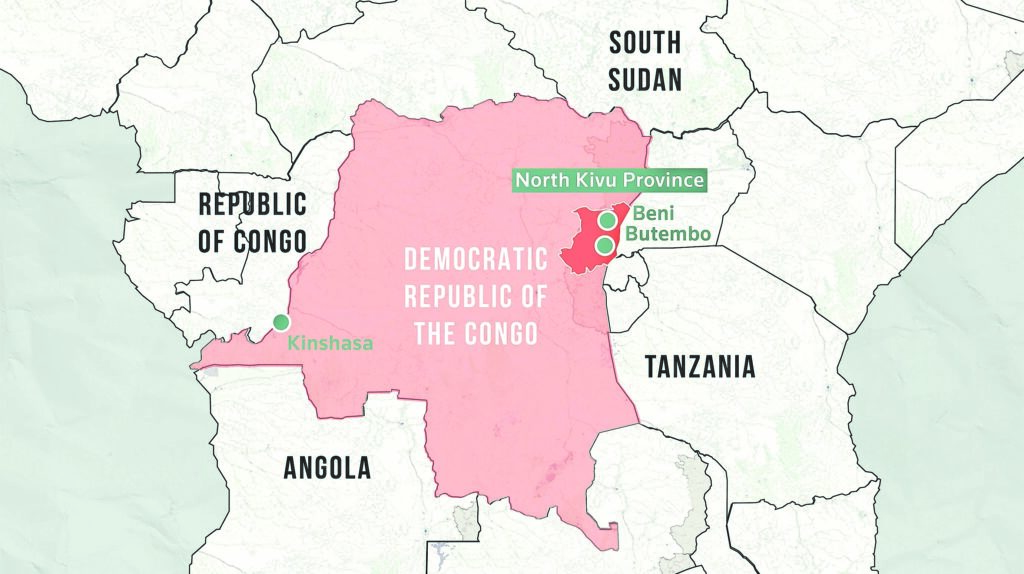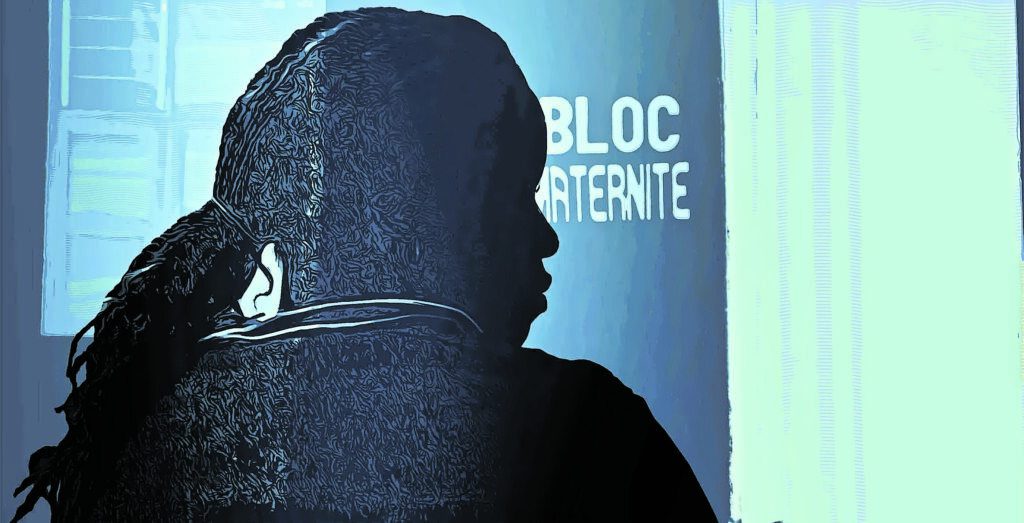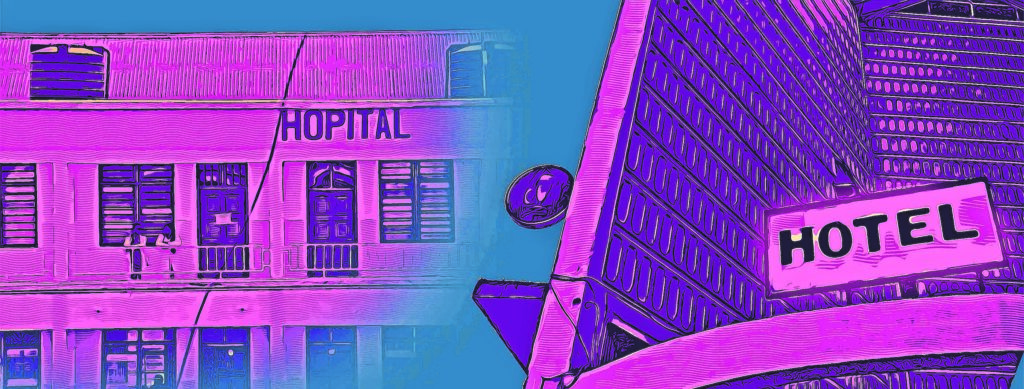Crime scenes: These artist
illustrations portray a man
sitting at a hotel, a hospital
and a maternity ward in
Butembo, a DRC aid hub in
the Ebola outbreak of 2018-
2020 where local women were
allegedly abused. Illustrations:
Robert Flummerfelt/The New
Humanitarian
More than 20 Congolese women have accused aid workers of sexual abuse in new claims that include rape and unwanted pregnancies, with United Nations investigators uncovering similar allegations of workers exploiting vulnerable women.
The New Humanitarian and the Thomson Reuters Foundation spoke to 22 women in Butembo, who said male aid workers responding to an Ebola crisis in the Democratic Republic of Congo (DRC) offered them jobs in exchange for sex.

Fourteen of the 22 women in Butembo — an aid hub during the Ebola outbreak — said the men identified themselves as workers with the World Health Organisation (WHO), a lead agency in the crisis, in which 2 200 people died between 2018 and 2020.
“WHO is committed to taking prompt and robust action, including collaborating with relevant national authorities on criminal proceedings, in all cases where WHO staff may be found guilty of perpetrating [sexual exploitation and abuse],” said WHO spokeswoman Marcia Poole.
A total of seven organisations were named, including two other UN agencies.
One woman said she was raped by a man who said he was with the WHO, and reporters learned of three others who said they had become pregnant. One of those women died after a botched abortion as she tried to conceal the pregnancy from her family, her sister said.
“If I give you work, what will you give me in return?” read a WhatsApp message shared with reporters by another woman, who said she drank a poisonous concoction to terminate her pregnancy — common in the DRC, where abortion is illegal.
She said the message was from a Congolese man she met in a bar in 2019 who arrived in a vehicle bearing the WHO logo. The message continued: “You are a woman. I think you know what you can give me.”
The woman said she had sex with the man and was then employed by the WHO as a cleaner. She said after she was given work, she was expected to sleep with him regularly. When she became pregnant, the man blocked her on WhatsApp and she then had an abortion, she said.
The WHO said the UN’s investigative Office of Internal Oversight Services (OIOS) had identified two women in Butembo as “potentially having had sexually exploitative relationships with individuals connected to WHO”.
It said the information would be shared with an independent commission set up in October to investigate claims of sexual exploitation and abuse during the DRC’s Ebola outbreak.
In response to the allegations of rape, pregnancy and the woman’s death from abortion-related complications, the WHO said it had been instructed to refer all allegations relating to the response during that time period to the commission.
“The commission will take the lead in investigating these allegations and will issue recommendations to the director-general,” Poole said in an email.
A spokeswoman for the independent commission, Kadidia Coulibaly, said its team began investigating on the ground in early May and that the commission aims to publish its report at the end of August.
Reporters in Butembo conducted more than 40 interviews with the women, aid workers, hotel staff and others who worked in the Ebola response over a five-month period.
Most women were hired as cleaners in Ebola treatment centres, where they would disinfect clothing and bedding for the sick and for responders. Others went to villages where they burned the belongings of Ebola victims or worked on awareness campaigns.
One woman said she thought she was going for a job interview. Instead, she said she was raped in a hotel room by a Cameroonian man who said he worked for the WHO.
 In this illustration, a woman’s profile can be seen at a maternity ward in a hospital in the eastern Democratic Republic of Congo. One woman in Butembo – an aid hub during the 2018 to 2020 Ebola crisis – told the Thomson Reuters Foundation and The New Humanitarian that she had a baby after a man gave her a job with the World Health Organisation in exchange for sex. Illustration by Robert Flummerfelt / The New Humanitarian.
In this illustration, a woman’s profile can be seen at a maternity ward in a hospital in the eastern Democratic Republic of Congo. One woman in Butembo – an aid hub during the 2018 to 2020 Ebola crisis – told the Thomson Reuters Foundation and The New Humanitarian that she had a baby after a man gave her a job with the World Health Organisation in exchange for sex. Illustration by Robert Flummerfelt / The New Humanitarian.
In 2019, the mother of four was told by a friend working for the WHO that her supervisor was looking to hire a new cleaner. There was one condition, said the friend: “No matter what he tells you, just agree.” The two women went to the man’s hotel room. After a brief introduction, the friend took a phone call and left the room. The man quickly came to the point, the 32-year-old woman said — have sex with him and she could have a job.
She said she tried to leave but the man blocked her.
“He pushed me onto the bed, forced himself on top of me and started to take my clothes off. I tried to get out from under him, but he was so strong and he held me there. Then, he violated me,” she said.
Several days later, she said he called to tell her she could start work. “Every day at work it was miserable.”
The WHO said it was unable to respond to the allegation of rape but would refer the information on to the independent commission.
Another woman said her sister died in 2019 after paying $300 on the black market for a concoction to end her pregnancy. She sought an abortion after having sex with a man who said he worked for the WHO and gave her a job as a cleaner.
Desperate for money to provide for her three children — her husband had been away for months in another part of the DRC — she agreed to have sex with him and was terrified when she fell pregnant, fearing her husband would soon return. Then she had the abortion, which proved fatal.
“If it weren’t for this Ebola response, my sister would still be alive and fighting for her children,” said the woman, 37, whose identity has been withheld to ensure the privacy of the family.
The WHO said it was unable to respond to the allegation but would refer the information they were given to the independent commission.
Much of the alleged abuse in Butembo occurred in a handful of hotels used by aid workers.
With its green lawns and tropical flowers, Hotel Butembo was a popular haunt for aid workers, who plied women with drinks and coaxed them up to their rooms, four hotel staff said.
The workers spoke on condition of anonymity for fear of losing their jobs and asked that their positions not be identified, given the small number of staff at Hotel Butembo.
 In this illustration, a hospital and a hotel can be seen. One woman told the Thomson Reuters Foundation and The New Humanitarian that her sister died in 2019 from a botched abortion after having sex with a man who said he worked for the WHO and gave her a job with the agency as a cleaner. Illustration by Robert Flummerfelt / The New Humanitarian.
In this illustration, a hospital and a hotel can be seen. One woman told the Thomson Reuters Foundation and The New Humanitarian that her sister died in 2019 from a botched abortion after having sex with a man who said he worked for the WHO and gave her a job with the agency as a cleaner. Illustration by Robert Flummerfelt / The New Humanitarian.
The medical charity Médecins sans Frontières (MSF) occupied the property at the beginning of the response in 2018, but after unidentified assailants attacked its treatment centre in February 2019, it withdrew and WHO workers moved in.
One hotel worker, who has been employed there for three years, told reporters that MSF staff had strictly enforced a ban on outside visitors and a night-time curfew.
“When WHO took over, everything changed,” the worker said.
“We would see young women from town constantly entering at the front gate … All the rules were relaxed.”
Another hotel worker described women arriving in marked WHO vehicles, and noted that several women became pregnant.
The WHO said it was not aware of any allegations of misconduct by its staff at Hotel Butembo.
A hotel worker who was an employee at the time said: “What was happening here was plain to see. Anybody living here would’ve known that it was happening. It wasn’t a secret.”
Staff at Hotel Butembo declined to share the owners’ phone numbers or emails. A message with a contact number left by The New Humanitarian and the Thomson Reuters Foundation at the reception desk for the owners went unanswered.
This investigation follows one done last September in Beni, 60km northeast of Butembo. There, 51 women said dozens of men, mostly foreigners, had coerced them into having sex in exchange for jobs.
This investigation was carried out by the Thomson Reuters Foundation and The New Humanitarian